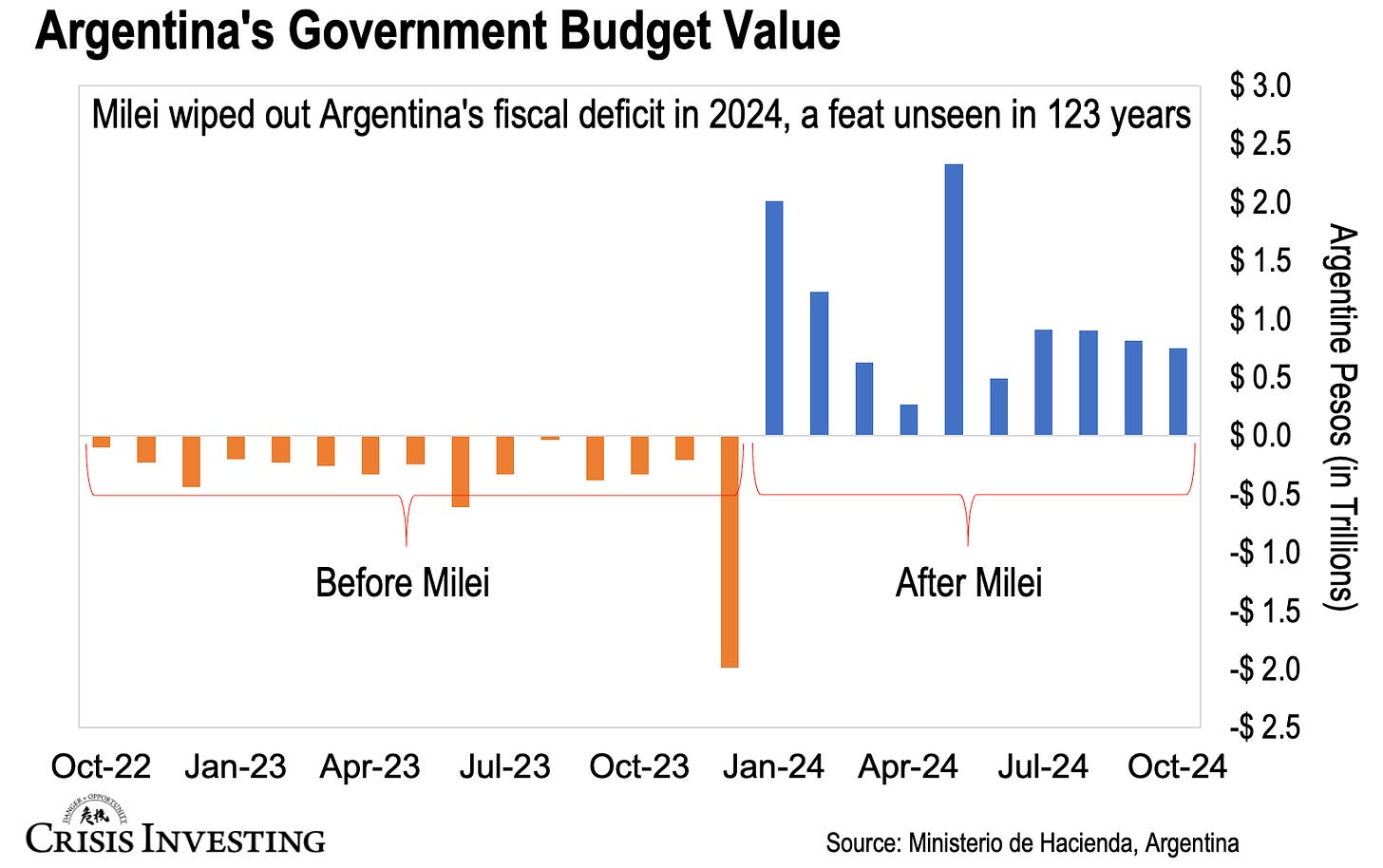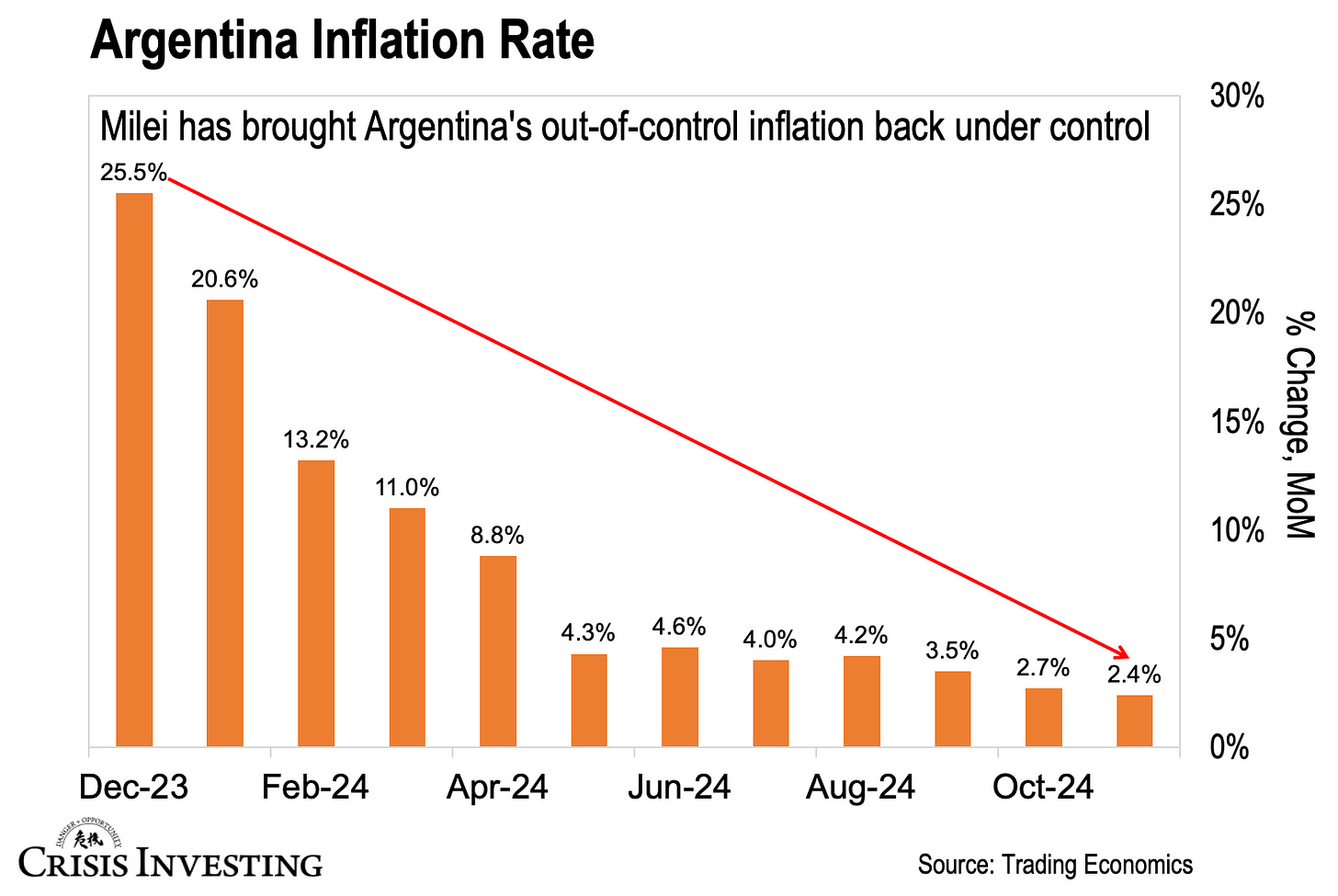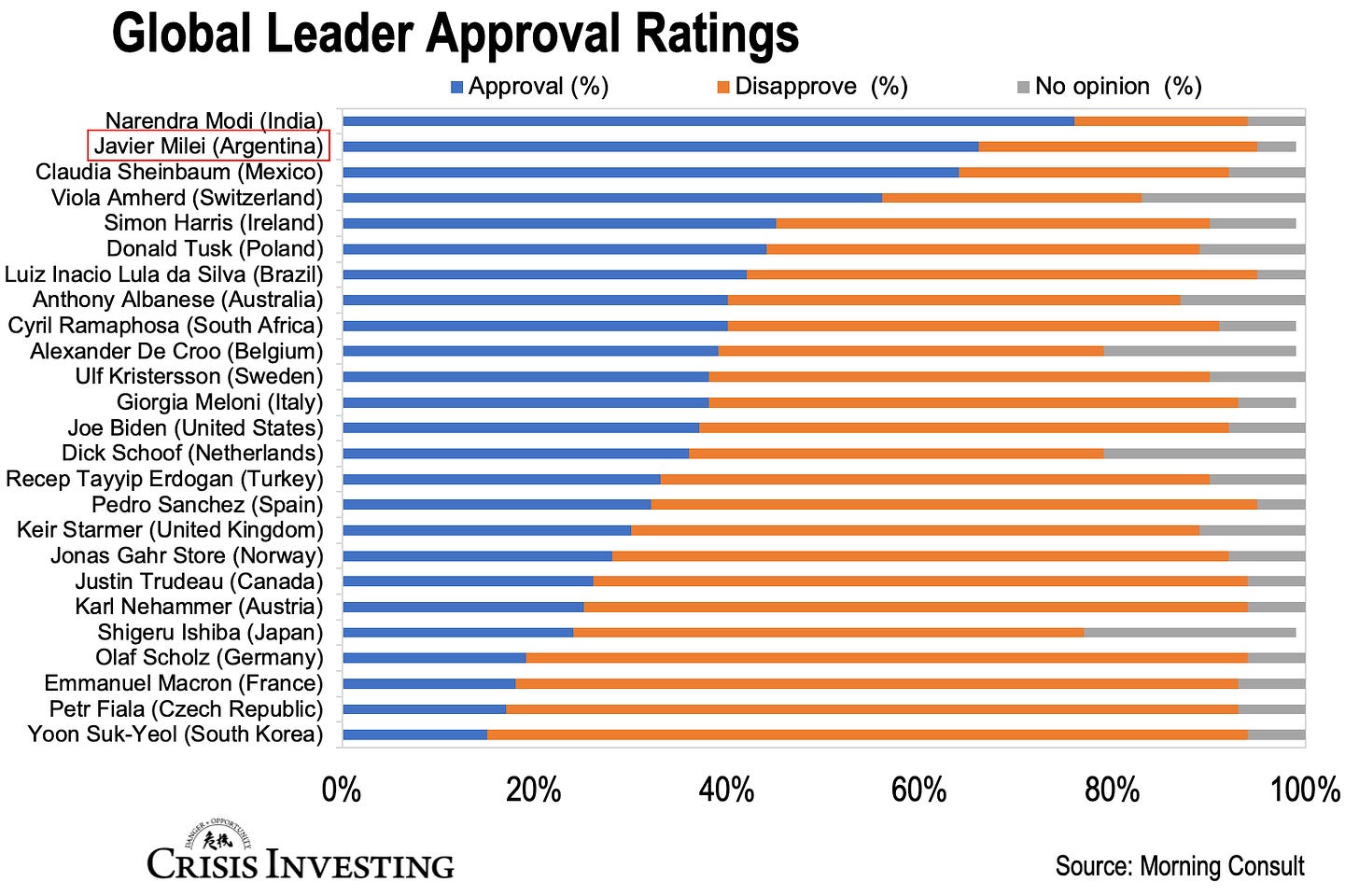One year ago, Javier Milei, the chainsaw-wielding libertarian, took office as president of Argentina. His promise? To bring that same chainsaw to Argentina's bureaucracy and government waste.
On December 10, the day of his inauguration, Milei addressed the crowd with these words in his speech:
We have no alternatives and no time. We have no room for sterile discussions. Our country demands action and immediate action. The political class is leaving a country on the brink of the deepest crisis in its history. Each of them will have to take their responsibility.
However, our commitment to the Argentine people is unwavering. We will make all the necessary decisions to solve the problem caused by 100 years of profligacy of the political class. Even if it is difficult at first. We know that the situation will get worse in the short term.
So God bless the Argentines and may the powers of heaven be with us in this challenge. Thank you very much. It will be difficult, but we will do it.
And boy, did he deliver on that promise. In just twelve months, he’s devalued the currency by 50%, eliminated price controls, scrapped subsidies, halted public works, and, in countless other ways, taken a chainsaw to government spending.
His attack on Argentina’s bloated state apparatus was equally ruthless. On his first day in office, he signed an executive order cutting 12 government agencies, leaving just eight, and laid off 50,000 state workers. By July, he had established a Ministry of Deregulation that has been churning out an average of two deregulations per day, systematically dismantling decades of bureaucratic bloat. He even announced that AFIP—Argentina's version of the IRS—would be dismantled and replaced with a significantly smaller organization.
These were no random measures—they were precision strikes against what Milei calls "the political caste"—the parasitic class living off the state while robbing Argentine citizens through taxes and inflation.
Reaping the Fruits (of Milei’s Labor)
Twelve months in, the results of these policies have been nothing short of spectacular.
For starters, Milei created the first monthly budget surplus Argentina had seen in 12 years. Impressively, he pulled this off in his first full month, even while paying interest on Argentina's enormous national debt. It was a huge win, especially considering that debt and overspending were the main drivers of triple-digit inflation in 2023. And as you can see in the chart below, he’s kept it going—surplus after surplus, month after month.
And just last week, on December 11, Milei made a historic announcement: a sustained fiscal surplus for the first time in—drumroll, please—123 years. Here’s what he said:
The deficit was the root of all our evils—without it, there’s no debt, no emission, no inflation.
Today, we have a sustained fiscal surplus, free of default, for the first time in 123 years.
This historic achievement came from the greatest adjustment in history and reducing monetary emission to zero.
Now, when Milei ran for president, he promised that if things went well, inflation would drop below 3% by year-end. Last month, Argentina’s monthly inflation hit 2.4%, its lowest in four years—down from nearly 26% when he took office in December 2023. Clearly, his "zero tolerance" for deficit spending is working.
Granted, 2.4% monthly inflation is still high by Western standards, but for Argentina, it's a major victory.
Keep in mind, when Milei came in, the country was teetering on the edge of hyperinflation. When I visited in early 2023, the exchange rate was about $1 for 400 pesos. By the end of the year, it had soared to nearly 900 pesos for $1. That level of devaluation is almost impossible for Americans to wrap their heads around.
More importantly, inflation at 2.4% is actually lower than Argentina’s average wage growth. Wages are up about 6%, meaning real wage growth is around 2-3% month-over-month. That’s the fastest rate in years.
Outside of that, things have improved across the board. From tripling the number of available rental apartments in Buenos Aires (thanks to the elimination of rent controls, which has also brought rents down) to Argentina running trade surpluses. Investor confidence is up too—Argentinian bonds have doubled, and the stock market has soared by triple digits since Milei took office.
Success That's Too Dangerous to Acknowledge
Of course, if you're reading the mainstream media, you're probably getting a very different story. They're busy wringing their hands about the "human cost" of Milei's reforms. "Argentina's poor bear the brunt of Milei's shock therapy," wails Reuters. "Poverty soars as Milei's cuts bite," laments The Guardian. They paint a picture of a country in crisis, suffering under the weight of radical libertarian policies from their callous (and, of course, far-right) president.
Here's what they don't mention though: Even with all the bitter pills to swallow, Milei still has the support of Argentines.
His approval rating sits at a remarkable 66%, higher than his predecessors at the same point in their terms. That’s up about five points from a few months ago, making Javier Milei the second most popular leader globally, behind only India's Narendra Modi.
You know why?
It goes back to that excerpt from Milei’s inauguration speech I shared earlier. He didn’t sugarcoat anything or hide his intentions like most politicians. He didn’t give voters empty promises. Argentinians knew exactly what they were getting when they voted for Milei.
So, it's no surprise that, one year in, despite some temporary hardships, they are still backing their chainsaw-wielding president. They understand something the media doesn't—Milei is the solution to Argentina's economic mess, and the pain of reform is nothing compared to the slow death of socialism.
Now, to be clear, things aren’t perfect. Argentina’s economy is in recession, and there’s still a lot to be done. But the fact that Milei has accomplished all this in just a year, while still maintaining sky-high approval ratings, is nothing short of remarkable.
And that's the problem for the globalist establishment and the mainstream media. What’s happening in Argentina is an unprecedented endeavor in free markets. If it succeeds, it could cast doubt on how things are run here in America and around the world. Remember, the newly announced Department of Government Efficiency (DOGE) in the upcoming Trump administration, led by Elon Musk and Vivek Ramaswamy, is explicitly modeling its approach on Milei's success.
Proponents of big government, unlimited spending, and ballooning debt can’t have this, so they obviously want Milei to fail.
Regards,
Lau Vegys






Milei is proving what Trump says is real. Here's praying Trump is as successful as Milei!!
Excellent piece! Thank's